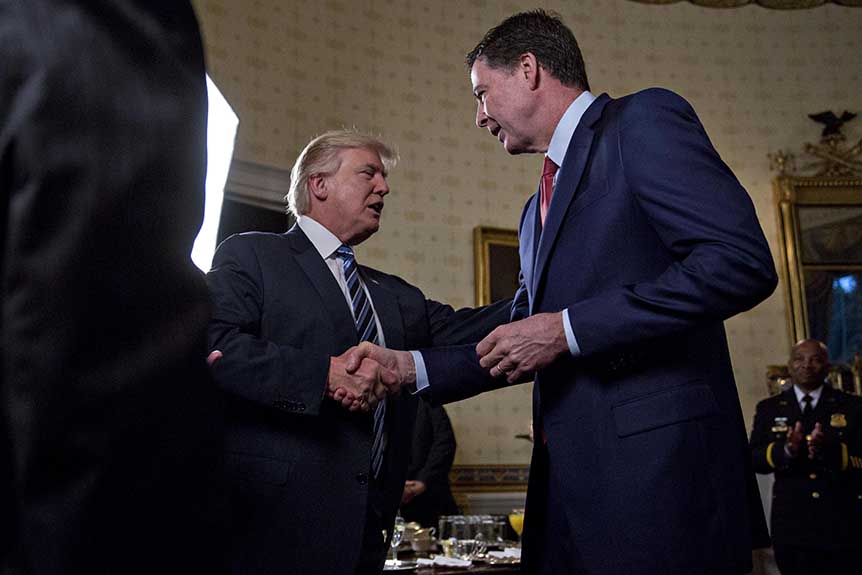What would happen if Trump fired James Comey?
Trump has all the power he needs to get the FBI director out of his hair. But the fallout could threaten his presidency.
James Comey, director of the Federal Bureau of Investigation (FBI), arrives to a Senate Judiciary Committee in Washington, D.C., U.S., on Wednesday, Dec. 9, 2015. The California couple who fatally shot 14 people last week in what authorities are calling a terror attack had become radicalized and discussed martyrdom at least two years ago, Comey said. (Andrew Harre/Bloomberg/Getty Images)
Share
Editor’s note: On May 9, 2017, Donald Trump fired James Comey.
In 1993, President Bill Clinton fired the director of the FBI. The man, William Sessions (no relation to Attorney General Jeff Sessions), had used FBI vehicles to shuttle his wife to get manicures; he had bumped colleagues off flights to make room for her, and he’d spent $10,000 of public funds to build a fence for his yard.
President Donald Trump has no such cause to fire James Comey, but legally, he doesn’t need it. Trump’s powers include ousting any director of an executive branch, and the president has clearly been nettled by Comey, who took to a podium and announced an investigation into the Trump team’s fraternizing with Russia during last year’s campaign. “I wouldn’t be surprised if we see him firing Comey in the next few weeks or months,” says Elura Nanos, a lawyer and television personality who has written on this topic for a legal affairs blog. “The firing is well within his right. There’s no question.”
This scenario raises a host of “could” and “would” questions—some with existential implications for Trump’s presidency. After appointing a new FBI director, could Trump go further to quash the investigation? Would Congress turn up anything in its own investigations? Would the FBI leak? Since the timing of the firing would raise suspicion of a cover-up, could Comey’s dismissal become a story, if you will, of James and the Giant Impeach? Bill Clinton proved that the president has the power to fire the head of the bureau, but, “when a president can fire an FBI director has never actually been tested,” says Nanos. “We’re kind of inventing it as we go along.”

If Trump sacked Comey, Congress could conceivably protest that the relevant law implies he needed appropriate cause. Yet to impeach Trump, a member of the House would need to charge him with breaking the law based on a potential implication, and all the non-G.O.P. members plus at least four Republicans would have to vote to impeach. More likely, Trump would remain president—albeit with an inflamed and mistrustful Congress to deal with.
RELATED: Donald Trump’s firing of James Comey is ‘breathtakingly unwise’
“There would be a firestorm among the Republicans and Democrats for doing that,” says Stephen Farnsworth, a political scientist at University of Mary Washington, in Fredericksburg, Va. Comey is widely respected on Capitol Hill, having served as the deputy attorney general under George W. Bush, before becoming FBI director under Barack Obama. FBI directors hold 10-year terms specifically so they span presidencies, and they have long been seen as independent; even after Comey announced investigations into Hillary Clinton’s e-mails, Obama kept him on (his term ends in 2023). By the same convention, when it emerged that Richard Nixon ordered the firing of Archibald Cox, the special prosecutor in the Watergate investigation, the president was seen as abusing power and forced to resign.
WATCH MORE: Factchecking Donald Trump’s many whoppers
“If there’s one thing Trump would be good to avoid, it’s a comparison to Richard Nixon,” says Farnsworth. Aside from the FBI, four committees in the White House are already investigating Trump’s ties to Russia, though the head of the House Intelligence Committee, Republican Devin Nunes, made a questionable decision to report his findings in a press conference before telling the committee. Opposition members are also criticizing Trump for forcing the resignation of Preet Bahjara, the New York City southern district attorney who was reportedly investigating the personal finances of Trump’s health care and social services secretary, Tom Price.
“It’s going to be a psychological disaster,” says Bart Rossi, a political psychologist in New Jersey, of Trump dismissing Comey. Rossi says Americans would wonder, “is this man in control of himself?” and adds: “It’d flip them over to ask, ‘is this man really pathological?’ Which I think he is, but a lot of people aren’t yet thinking.”
Within the FBI, the investigation would theoretically continue. In private, Trump could order the new director to quash the investigation, but the information would likely get leaked, given the organization’s history of spilling secrets when it senses a threat to its independence.
Meanwhile, Comey himself could become a free flow of dirt on the president. “The first rule of Washington politics is, ‘don’t make an enemy of the FBI,’ ” says Farnsworth. Firing the director would only pique public suspicion and prompt further investigation. “Not that he might not do it,” says Farnsworth, “but it would be breathtakingly unwise.”
WATCH MORE: Canada has a message for Donald Trump
MORE ABOUT JAMES COMEY:
- What would happen if Trump fired James Comey?
- Manafort worked for Russian billionaire to ‘benefit Putin government’: documents
- Party or country? The Republicans choose a side.
- James Comey confirms FBI investigation of Russia interference
- White House stands by disputed wiretapping story
- FBI searched Weiner computer for ‘intrusions’, says warrant
- Clinton email case causes turmoil inside the FBI
- FBI director: No new charges from latest Hillary Clinton emails